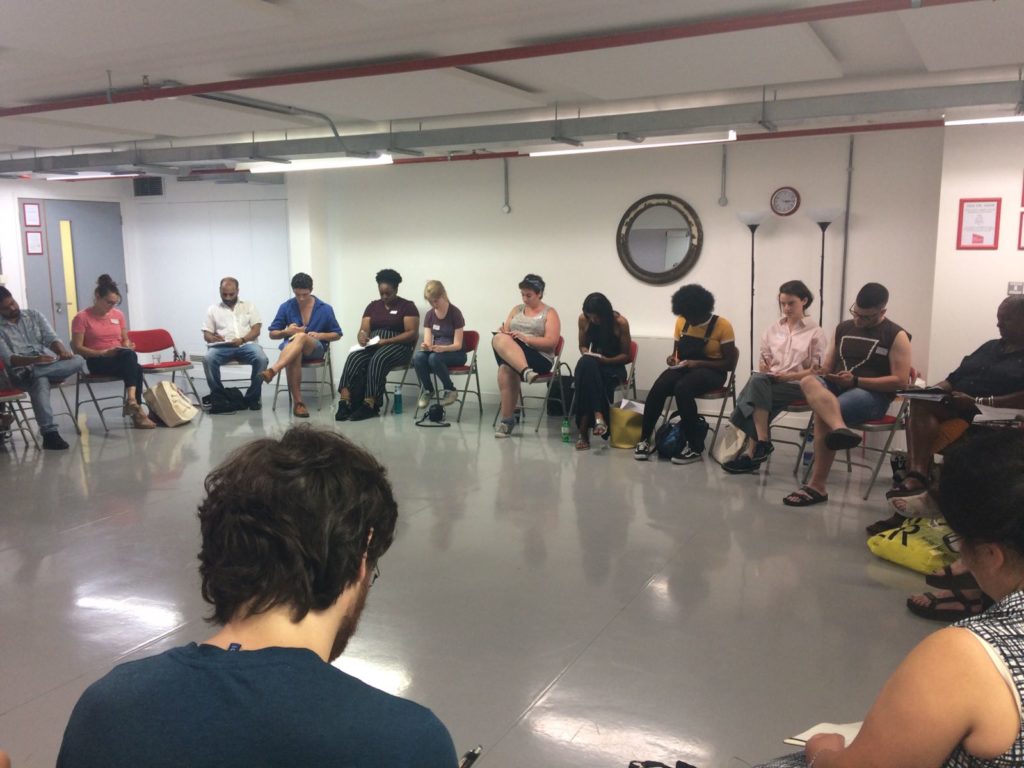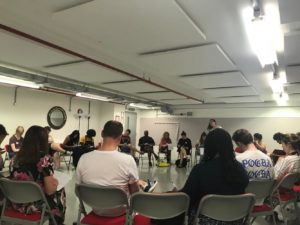Editor Jennifer Richards is recapping our practical workshop with Kimberley Andrews at London Writers’ Week! Want to learn how to get your creative inspiration juices flowing? Read on…
Getting excited about a story, and feeling like you just have to tell it, is a brilliant sensation. Feeling ideas bubbling up inside you, ready to spill onto the page.
But what about those times when you’re just staring at your computer (or typewriter if you’re old school), ready to write, and there’s not even a single spark of inspiration that’s coming to you?
Luckily Kimberley Andrews from London Playwrights’ Blog was on hand to help us all out with our creative inspiration during her workshop at London Writers’ Week.
She explained both how to get that first spark and, importantly, how to then shape it into an idea that can later become a story.
So here’s all her steps to help you banish that blank page and get back that wonderful feeling of having a story to tell:
1. Clear the cobwebs
Sometimes you just don’t feel like writing. Inspiration is refusing to strike, but a looming deadline means you really need to get on with it (*gulp*)
And that deadline is definitely not helping your stress levels. So in these moments, it’s good to get your brain into a different headspace; and doing a quick stream of consciousness scribble is a great way of doing that.
Starting her workshop this way, Kimberley got everyone’s creative juices flowing, with this simple exercise helping you let go of all the stresses that may have stopped you from feeling able to write.
After three minutes of scribbles, you’ll find your brain is in a different space and, hopefully, feeling a lot readier to write! It’s also a good idea to read back over your stream of consciousness and circle any ideas that may be of interest that you could return to later.
2. Let yourself experiment
Remember how you told stories as a child? Inventing crazy worlds and impossible scenarios that were never limited in how wild they could be? Do that again!
Kimberley got everyone to play the Consequences game, where each person in a group writes a different section of the story on one part of the paper, folding it as they go. Then when you open up the paper at the end, you’ve got a pretty bonkers story!
The great thing about doing this game is you feel completely free in what you’re writing, knowing it’s meant to be wacky, rather than worrying about creating an award-winning story.
Also the time pressure in a writing game is really useful, as it forces you to write anything down, not allowing you to procrastinate – which I’m guessing we’ve all been guilty of now and again?
See if you can get some friends, or family or your housemate to do a game of Consequences with you. And, if you’re home alone, why not try out the Headlines game Kimberley played with us next?
This game involves writing a bunch of themes down, like jealously or love, and cutting them all out into strips. Also print out a variety of news headlines, and then, pick one of the themes and one of the headlines (maybe pulling them out of a hat if you’re feeling adventurous!).
So have you got your theme and your headline?
Now try writing a play idea that could link both or, if that feels too difficult, maybe just try writing one line of dialogue or even a title of a play.
From Kimberley’s workshop, it was easy to see that even that smallest spark of an idea can light something much bigger if you give yourself some time to sit with the idea.
The best thing about the Headlines game is that it also pulls you out of your comfort zone as you’re forcing yourself to write about something you normally wouldn’t.
It sounds strange that constrictions could help improve your creativity, but it’s all about making your brain look at things differently.
3. Learn from others
No, this doesn’t mean directly stealing your ideas from others (wait, you’re telling me someone’s already done a film about two lovers aboard the Titanic? What?!).
It’s actually about finding ways to use another person’s creativity as a springboard for your own, without ripping off the Titanic (oops…)
During the workshop, we looked at film premises to see how they’re put together. We then used them to help us expand upon the stories we had already begun creating in the earlier games, by now making them into film premises.
Creating a film premise, or a book blurb, or a play text blurb, is a great step between having the initial idea and then actually writing the body of work. It doesn’t seem quite as daunting, but still helps you suss out the fundamental question of what the central conflict of your piece is about.
A film premise is essentially saying that “someone has to do something in order to…”, so have a go and fill that out for your idea.
Done it? Brilliant – onto the next stage!
4. Get feedback
After everyone had been silent, busy concentrating on creating their film premise, the room soon became full of chattering’s again as Kimberley got us all to pitch our films to each other.
We weren’t expecting to all get major film deals out of this (though how cool would it have been if Steven Spielberg was at our workshop?!), instead, it was just a great way of using feedback to shape our ideas even further.
By pitching to others, you have to zone in on what the heart of your piece is. You’re asking yourself what is the central idea in this story, why does it need to be told and, importantly, why does it need to told by you.
And, as well as helping you get to the heart of your story, chatting to others is a great way to soundboard ideas in general, if you’re not quite ready to do a film premise yet.
Whenever there’s something in one of my ideas that’s niggling away at me, making me feel like I can’t put it to page yet, I call my mum. I try explaining the idea to her, as that forces me to fill in the gaps my brain couldn’t work out. And whenever I finish chatting to her, I’ve always got a much more concrete story on my hands!
So, having started the workshop playing a children’s game, we had all left the session with a premise and a pitch.
Though the idea of waiting for creativity to strike and having your idea suddenly spill out of you sounds lovely, this is a bit of a romanticised idea of writing.
Sometimes you have to really work for the inspiration, and work even further to shape it into an idea. But when you’re playing children’s games, reading about your favourite films, and chatting to your friends, it honestly doesn’t really feel like work. And, best of all, you’re now ready to start writing the story!








